Russian antivirus giant Kaspersky says do svidaniya to US customers with 6 months of free software: 'stay safe'
Maybe they're just Biden their time.

This week the Russian antivirus company Kaspersky Labs announced it is withdrawing from the United States, following a June decision by the Biden administration to ban the sale of Kaspersky software over alleged links to the Kremlin. This was the culmination of a series of restrictions imposed by the US government: In 2017 the Department of Homeland Security issued a directive banning federal agencies from using Kaspersky software, while in 2018 the same rule was applied to the US military.
Further to its recent statement, Kaspersky has now announced something of a farewell gift to its US customers: six months of free security software and updates (thanks, The Register). The way it chose to announce this was via a letter addressed "To our lovely you", which also features a green teddy bear holding a heart balloon and a "stay safe" sign, with a single tear in its eye.
Is… is Uncle Sam the baddy? The letter thanks US customers for "choosing and trusting Kaspersky throughout the years," and goes on to say that with "Kaspersky leaving the US, we'd like to pay you back with the least we can: gifting you a selection of our security solutions for free for six months."
The software can be downloaded on the Kaspersky site, and includes: Kaspersky Standard; Kaspersky Plus; Kaspersky Password Manager; Kaspersky Safe Kids; and Kaspersky VPN Secure Connection.
"We've always strived and remain committed to provide the best cybersecurity there is—independent, transparent and expertly managed," says Kaspersky. "Unfortunately, for now, you have one less choice in defending yourself against online threats."
The US ban comes into effect on September 29, after which Kaspersky will no longer be able to update the software. "Following the compliance requirements, we will be forced to stop antivirus signature and codebase updates plus disconnect apps from Kaspersky Security Network after September 29," says Kaspersky. "Other functionality will continue working, including the core anti-malware functionality."
The letter from the antivirus company ends with some security tips for users "while we're gone", which are fairly standard but good advice all the same:
Keep up to date with the most important stories and the best deals, as picked by the PC Gamer team.
- Remember to always back up your data.
- Be wary of links and double-check their source before clicking.
- Protect your identity online, change passwords regularly and keep them long and complex.
Well, I hope the US government is happy with itself. For its part, the Biden administration alleges Kaspersky represents a national security threat and is under Moscow's thumb. Kaspersky denies that it is a threat to US national security, or that its products provide a potential backdoor for Moscow to go snooping around American computers. It called the ban a symptom of "present geopolitical climate and theoretical concerns."

Rich is a games journalist with 15 years' experience, beginning his career on Edge magazine before working for a wide range of outlets, including Ars Technica, Eurogamer, GamesRadar+, Gamespot, the Guardian, IGN, the New Statesman, Polygon, and Vice. He was the editor of Kotaku UK, the UK arm of Kotaku, for three years before joining PC Gamer. He is the author of a Brief History of Video Games, a full history of the medium, which the Midwest Book Review described as "[a] must-read for serious minded game historians and curious video game connoisseurs alike."

